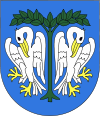Lowicz
| Łowicz | |||
|---|---|---|---|

Cathedral in Łowicz
|
|||
|
|||
| Coordinates: 52°6′N 19°56′E / 52.100°N 19.933°ECoordinates: 52°6′N 19°56′E / 52.100°N 19.933°E | |||
| Country |
|
||
| Voivodeship | Łódź | ||
| County | Łowicz County | ||
| Gmina | Łowicz (urban gmina) | ||
| Established | before 1136 | ||
| Town rights | before 1298 | ||
| Government | |||
| • Mayor | Krzysztof Kaliński | ||
| Area | |||
| • Total | 23.41 km2 (9.04 sq mi) | ||
| Population (31.12.2016) | |||
| • Total | 28,811 | ||
| • Density | 1,200/km2 (3,200/sq mi) | ||
| Time zone | CET (UTC+1) | ||
| • Summer (DST) | CEST (UTC+2) | ||
| Postal code | 99-400 to 99-402 | ||
| Area code(s) | +48 46 | ||
| Car plates | ELC | ||
| Website | www |
||
Łowicz [ˈwɔvʲit͡ʂ] is a town in central Poland with 28,811 inhabitants (2016). It is situated in the Łódź Voivodeship (since 1999); previously, it was in Skierniewice Voivodeship (1975–1998). Together with a nearby station of Bednary, Łowicz is a major rail junction of central Poland, where the line from Warsaw splits into two directions - towards Poznań, and Łódź. Also, the station Łowicz Main is connected through a secondary-importance line with Skierniewice.
Łowicz was a residence of Polish primates in the Polish–Lithuanian Commonwealth. They served as regents when the town became a temporary "capital" of Poland during the interregnum. As a result, Łowicz has its own bishop and a basilica in spite of its considerably small size. The ruins of a former bishop's castle can be found on the outskirts of town. Napoleon Bonaparte is believed to have stayed in one of the houses on the main square. Also, the town was at the centre of the largest battle of the German invasion of Poland, the Battle of the Bzura River in the opening campaign of World War II.
Łowicz has an important ethnographic museum (Muzeum w Łowiczu) exhibiting Polish art and historical artifacts from the region. Also, Łowicz features a popular skansen with traditional wooden houses. It is a vast open-air display of historical structures depicting traditional Polish village-life; a collection of artifacts spread over a 17-hectare (42 acre) site, just outside the town. Łowicz has also a football team called Pelikan, who languish in the lower divisions of the Polish leagues.
...
Wikipedia



